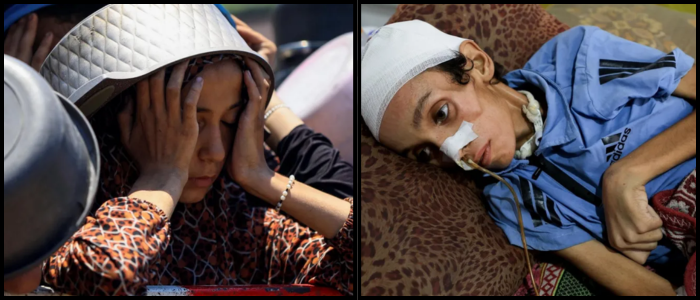Israel, which controls access to the Gaza Strip, has dismissed these claims and accused the organisations of promoting the views of Hamas. The warning from aid groups comes as Gaza's health ministry, which is operated by Hamas, reported 10 more deaths from malnutrition within the past 24 hours. This brings the total number of starvation-related deaths since Sunday to 43.
The United Nations has confirmed that hospitals are admitting patients in extreme states of exhaustion and malnutrition. In some cases, people have collapsed in the streets from hunger. Aid workers, now struggling to feed their own families, have joined food queues, even at the risk of being shot.
Critical Shortages and Rising Death Toll
Since March, Israel has imposed a full blockade on aid deliveries to Gaza, followed by a renewed military campaign two weeks later. The aim was to pressure Hamas into releasing Israeli hostages. Though the blockade was slightly relaxed after nearly two months, food, fuel, and medical supplies have become increasingly scarce.
Doctors are now witnessing record rates of acute malnutrition, particularly among children and elderly people. Illnesses like acute watery diarrhoea are on the rise, markets are empty, and people are collapsing from hunger and dehydration. One aid worker shared that children are telling their parents they want to go to heaven because "at least heaven has food."
The World Health Organisation has warned that a quarter of Gaza's population is experiencing famine-like conditions, and nearly 100,000 women and children urgently need treatment for severe acute malnutrition. The WHO's director described the situation as "mass starvation" and stressed that it is man-made, caused by the ongoing blockade.
In Khan Younis, the head of paediatrics at Nasser hospital, Dr Ahmad al-Farra, said no food has been available for three days. He described children arriving at his unit suffering from various levels of starvation, some dying from malnutrition and others unable to absorb nutrients due to other health issues. Residents say prices at markets have become unaffordable. One man stated that his family needs 300 shekels (about $90) daily just to buy flour.
Challenges in Delivering Aid and Calls for Action
Humanitarian organisations have highlighted the extreme challenges in delivering aid. Nearly all of Gaza's population has been displaced and now lives in less than 12% of the territory. Aid access is further hindered by Israeli evacuation orders and militarised zones. On average, only 28 truckloads of aid are distributed in Gaza each day.
The organisations also reported that over 1,050 Palestinians have been killed while trying to access food since 27 May. Of these, 766 deaths occurred near four aid sites operated by the Gaza Humanitarian Foundation (GHF), which are inside Israeli military zones and guarded by private US security contractors. Another 288 deaths occurred near UN and other aid convoys. Israel maintains that its forces near these sites only fire warning shots and do not target civilians. The GHF, in turn, disputes the figures presented by Gaza's health ministry.
Meanwhile, Israel's military coordination body, Cogat, reported that nearly 4,500 aid trucks entered Gaza in the last two months, including 2,500 tonnes of baby food and special high-calorie supplies. Drone footage released shows about 950 truckloads of aid waiting to be picked up inside Gaza, suggesting the issue lies in distribution rather than supply.
However, the UN says it faces difficulty in getting approval from Israel to collect and distribute aid. Road damage, fuel shortages, ongoing fighting, and armed gang looting have all disrupted aid efforts. UN officials also claim civilians approaching aid convoys have come under fire, despite prior assurances of safety from Israeli forces.
The humanitarian organisations have now urged governments worldwide to take firm action. They are calling for a permanent ceasefire, unrestricted aid access, and the removal of military control over aid distribution. They also recommend halting arms transfers and supporting only neutral humanitarian responses.
Israel's foreign ministry has rejected these statements, accusing the organisations of siding with Hamas and undermining peace negotiations. The ministry claims such comments harm the chances of securing a new ceasefire and hostage release deal.
Israel launched its current military campaign in response to the 7 October 2023 Hamas-led attack on southern Israel, where around 1,200 people were killed and 251 taken hostage. According to Gaza's Hamas-run health ministry, at least 59,219 people have been killed in the territory since then.
World

Gaza Starvation Crisis Deepens Amid Aid Blockade

Over 100 global humanitarian and rights organisations have raised urgent alarms about a growing crisis of mass starvation in Gaza. These groups say their aid workers, along with the people they serve, are now "wasting away" due to a severe lack of food and medical supplies.















